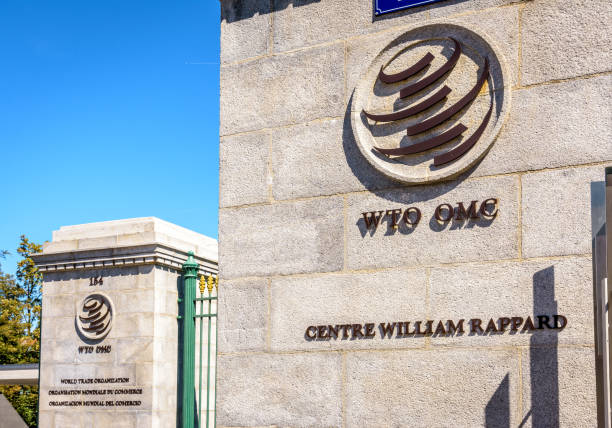
With a view to determining the economic fortunes of nations amidst this intricate network that is international trade, perhaps no other organization plays so pivotal a role at present as does the World Trade Organization (WTO). Established in 1995, the main role of the WTO has been to promote free trade, destroy barriers created by states which prevent trade with other countries. While issuing equal rights for all member nations. Although they are often hindered by protectionist policies and unequal access to markets, developing nations have profited from the WTO’s determination that a fair-trading system be constructed in which most weapons of trade warfare like nationalization or denationalization will find safe havens.
The WTO is a multilateral organization governing systems of trade between states. It has a
unique tripod purpose. In particular, it tries to foster liberal-minded trade development and banish protectionism barriers that states place on the importation and exportation of goods and services, and balances out restrictive measures that sovereigns take against imports or exports disrupt trade and reduce generally prosperity.
Second the WTO provides its members with a negotiating forum referred to as ‘rounds’. Member states take turns in meetings and rotating chairmanship at each and lastly the WTO seeks to establish clear rules of engagement to ensure closer and more rewarding international trade.
The role of the WTO in helping developing countries to achieve economic development , the organization aims at continuously improving market access for products coming from developing countries such as the duty free and quota free (DFQF) market access, preferential rules of origin and the service waiver indicate members commitment to the development of these countries , while WTO members generous extension until 1 July 2034 of the transition period for developing countries under the WTO’s Agreement on Trade-Related Aspects of Intellectual Property Rights (TRIPS) attests to members’ willingness to allow these countries sufficient time to integrate WTO rules. Developing countries have also received special treatment in the implementation of multilateral agreements like the WTO Trade Facilitation Agreement (TFA), which has the potential to reduce trade costs.
After adopting WTO-recommended trade policies, developing nations in Asia, Africa, and Central and Latin America are progressing in terms of economic growth. China, Brazil, Chile, Singapore, Malaysia, Indonesia, and India are just a few instances of how economic policy regimes have combined long-term aims with WTO-related trade efforts and reforms. trading policy reforms in India and Pakistan following WTO admission are noteworthy since both of South Asia’s main economies implemented an open market trading system. Both countries, particularly India, are broadening their foreign trading horizons as a result of recent political stability. Pakistan, on the other hand, implemented openness in its economic policies in response to IMF recommendations and WTO trade reforms.
Following a severe foreign exchange crisis in 1991, India attracted both local and foreign investment through a long-term monetary and fiscal policy framework. India’s economic portfolio has grown significantly as a result of its openness and trade policy changes. As WTO member nations, regional forums such as SAARC aid in trade liberalization in the area. Other South Asian countries enjoy it.
India, a developing country in transition, experienced a surge in information technology exports after joining the WTO. As a result, India has become a worldwide technological powerhouse. The WTO’s non-discrimination and market access principles were decisive in India’s economic rise.
An important feature of the WTO is its dispute resolution mechanism, which gives member states most especially developing nations a forum for dealing with trade-related grievances. This mechanism plays the role of a shield and prohibits economic growth from being checked by unfair trade practices or discriminatory measures.
The other important player in world agriculture is Brazil, which used the WTO dispute resolution process to challenge developed nations cotton subsidies in particular those of the United States. This resolution in Brazil’s favour didn’t just redress an imbalance, but also demonstrated the WTO’s support for fair trade. The opening of the agricultural sector via a more reasonable position on tied aid was thus set up to help create economic growth through agriculture.
The WTO, which acknowledges the differing capabilities of member states especially in developing countries, has promoted capacity building and technical assistance programs. The purpose of these initiatives is to enable nations actively to participate in global trade so that economic growth will be both inclusive and sustainable.
The landlocked country of Rwanda has also reaped benefits from the WTO’s capacity building programs. These measures have enabled Rwanda to integrate into global markets, expanding exports and bringing about strong economic growth.
In conclusion, when we consider the WTO’s role in stimulating economic growth in developing countries, it is clear that the organization serves as a beacon of hope in the goal of global economic inclusion. While there are several success stories, difficulties remain, necessitating a continuous commitment to address issues like as special and differentiated treatment, agricultural subsidies, and the developing environment of digital commerce. The World Trade Organization’s mission is not fixed, it must adapt to the ever-changing dynamics of the global economy. As developing countries pursue economic progress, the WTO remains an important ally in negotiating the intricacies of international commerce. The WTO guarantees that the advantages of economic progress are shared by all nations by encouraging an atmosphere of justice, transparency, and collaboration.
By The European Institute for International Law and International Relations
References
Alam, Tasnim, how important has the WTO been in helping national governments achieve their economic policy aims? (April 25, 2022). Available at SSRN: https://ssrn.com/abstract=4092322 or http://dx.doi.org/10.2139/ssrn.4092322
Boosting trade opportunities for least-developed countries: Progress over the past ten years and current priorities. WTO. (n.d.). https://www.wto.org/english/res_e/publications_e/boottradeopp22_e.htm
Cato.org. (2023, October 24). https://www.cato.org/publications/globalization-has-propelled-india-prosperity#globalization-trade
Herbert, E. B. (2020). The role of world trade organisation in international trade and investment. Nnamdi Azikiwe University Journal of International Law and Jurisprudence, 11(1), 47-55.















